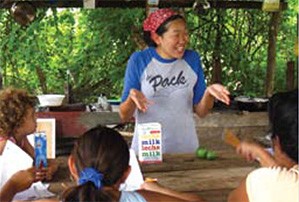
A taste of international travel interested Abby Konyndyk in immersing herself in a culture different from her own. She chose to come to the University of Michigan School of Social Work after hearing of the School’s growing international field placements.
Abby accompanied four other MSW students and Lecturer Bob Miller in the summer of 2008 to Costa Rica for eight weeks. To meet their field-related requirements, the students practiced community development and community organization in Falconiana, a rural community near the Nicaraguan border.
They were the first group of American students entering the communities, where they stayed for six weeks. “We had to introduce ourselves and create a way to teach the people who we were and what we were there to do,” says Abby. In doing so, notes Bob Miller, “I believe the students represented the United States well.”
Because they asked how the community wished them to help, their tasks were varied.
They worked with a small women’s association that studied agriculture and horticulture, teaching the women English so that they could set up an agrotourist business. Not having a printer, they handwrote lists of words and phrases in English. “I was satisfied to be able to see the progress the women made in English,” says Abby.
The students helped the association codify the thirtyfive types of plants grown there, and they did research on the purpose for each. Supervised by an older resident, the students built a substantial retention wall out of boulders. Once complete, the wall prevented soil from being washed away from the nearby fields that the association used for growing crops.
Bob Miller made connections for the group to partner in their work with the United Nations, the Costa Rican government, and the NGO Reto Juvenil Internacional. He has taken U-M students to Costa Rica in the past through the Global Intercultural Experience of Undergraduates Program and has seen students grow significantly each summer. “Our students learned intercultural competency and the impact upon us of learning another culture,” he comments.
Immersion in the culture was one goal of the field placement. “Home stays were the best part of the trip,” says Jenn Sanders regarding their first two weeks in which they lived with local families. “I learned about the country and culture and my Spanish really improved.” The students studied the language, and on their day off each week, they traveled and explored the country.
The students visited the University of Costa Rica’s School of Social Work to learn about social work issues in the country. “I now know that there’s so much more than the Western approach,” says Jenn. “Doing this field placement was one of the best decisions I have made.”
Abby agrees. “The field placement was so different from the kind of community organization that I did in my previous internship at Michigan.”
The group realized how important teamwork was as each used strengths for the benefit of the whole. “Each one of us had real responsibility for making this field placement successful for us and for the community,” says Abby.
Nellie Kim continues to draw on her experience even while taking classes after the internship. “The field placement gave me more focus to want to take full advantage of my last semester in the program and obtain practical social work skills. I have a better grasp on classroom materials as I can relate them to our experiences in Costa Rica. One of the many things I’d like to do is community development work in an international setting.”
—Tanya C. Hart Emley is editor of Ongoing.